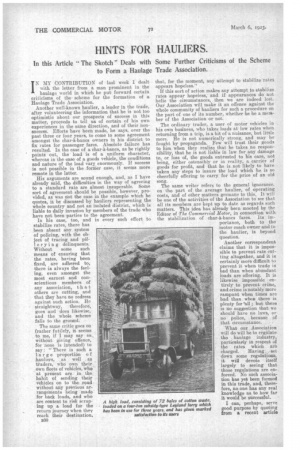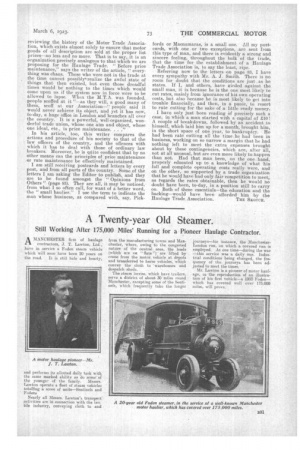HINTS FOR HAULIERS.
Page 14

Page 15

If you've noticed an error in this article please click here to report it so we can fix it.
In this Article "The Skotch" Deals with Some Further Criticisms of the Scheme to Form a Haulage Trade Association.
IN MY CONTRIBUTION of last week I dealt with the letter from a man prominent, in the haulage world in which he put forward certain criticisms of the scheme for the formation of a Haulage Trade Association.
Another well-known haulier, a leader in the trade, after volunteering the information that he is not too optimistic about our prospects of success in this matter, proceeds to tell us of certain of his own experiences in the same direction, and of their nonsuccess. Efforts have been made, he says, over the past three or four years, to come to some agreement amongst the char-h-bancs owners in his district to fix rates for passenger fares. Absolute failure has resulted. In the case of a char.k-bancs, as he rightly points out, the load is of a uniform character, whereas in the ease of a goods vehicle, the conditions and nature of the load vary enormously. If success is not possible in the . former case, it seems more remote in the latter.
His arguments are, sound enough, and, as I have already said, the difficulties in the way of agreeing to a standard rate are almost insuperable. Some sort of agreement should be possible, however, provided, as was not the case in the example which he quotes, it be discussed by hauliers representing the whole country and not an isolated district, which is liable to daily invasion by members of the trade who have not been parties to the agreement.
The same critic goes on (rather futilely, it seems to me, if I may say so. without giving offence, for none is intended) to say : " There is such a large proportion o f hauliers, as well as traders, who own their own fleets of vehicles, who at present are in the habit of sending their vehicles on to the road Without any previous arrangements being made for hack loads, and who are content to risk scraping up a load for the return journey when they reach their destination.
B30 that, for the moment, any attempt to stabilize rates appears hopeless." If this sort of action makes any attempt to stabilize rates appear hopeless, and if appearances do not belie the circumstances, then we are indeed lost. Our Association will make it an offence against the whole community of hauliers for such a procedure on the part of one of its number, whether he be a member of the Association or not.
The ordinary trader, a user of motor vehicles in his own business, who takes loads at low rates when returning from a trip, is a bit of a nuisance, but little more. He is not numerically strong, and may be fought. by propaganda. Few will trust their goods to him when they realize that he takes no responsibility, that he is not liable in law for any damage to, or loss of, the goods entrusted to his care, not being, either ostensibly or in reality, a carrier of goods for profit, and that he is ,not likely to have taken any steps to insure the load which he is so cheerfully offering to carry for the price of an old song.
The same writer refers to the general ignorance. on the part of the average haulier, of operating costs, and of other matters germane to this. It will be one of the activities of the Association to see that all its members are kept up to date as regards such matters. This idea has already been mooted by the Editor of Tim Commercial Motor, in connection with the stabilization of char-it-banes fares. Its importance, both to the motor coach owner and to the haulier, is beyond question.
Another correspondent claims that it is impossible to prevent rate cutting altogether, and it is certainly more difficult to prevent it when trade is bad than when abundant loads are offering. It is likewise impossible entirely to prevent crime, and crime is notablymore rampant when times are bad than when there is plenty for ; but there is no suggestion that we should have no laws, or no police, because of that circumstance.
What our Association will do will be to regulate the haulage industry, particularly in respect of the rates which are charged. Having.. set down some regulations, it will devote itself largely to seeing that those regulations are enforced. No such association has yet been formed in this trade, and, therefore, no one has any real knowledge as to how far it would be successful.
I can, perhaps, serve good purpose by quoting from a recent article
reviewing the history of the Motor Trade Association, which exists almost solely to ensure that motor goods of all description are sold at the proper list prices—no less and no more That is to say, it is an organization precisely analogous to that which we are proposing for the Haulage Trade. "Before price maintenance," says the writer of the article, " everything was chaos. Those who were not in the trade at the time cannot possibIrrealize the awful state of things that then existed, but even those dreadful times would be nothing to the times which would come upon us if the system now in force were to be allowed to lapse. When the M.T.A. was founded. people scoffed at it "—as they will, a good many of them, scoff at our Association—" people said it would never achieve its object, and yet it has now, to-day, a huge office in London and 'branches all over the country. It is a powerful, well-organized, wonderful trade union, whose one aim and object, whose one ideal, etc., is price maintenance. . . ."
In his article, too, this writer compares the actions and procedure of his society to that of the law officers of the country, and the offences with which it has to deal with those of ordinary law breakers. Moreover, he is quite confident that by no other means can the principles of price maintenance or rate maintenance be effectively maintained.
I am still receiving postcards and letters by every post, and from all parts of the country. Some of the letters I ant asking the Editor to publish, and they are to be found amongst the "Opinions from Others " (page 83). They are all, it may be noticed, from what I so often call, for want of a better word, the " small haulier." I use the term to indicate the man whose business, as compared with, say, Pick
fords or Macnamaras, is a small one. All my postcards, with one or two exceptions, are sent from this type of man, and there is evidently a, strong and sincere feeling, throughout the bulk of the trade, that the time for the establishment of a Haulage Trade Association is, to say the least, ripe.
Referring now to the letters on page 83, I have every sympathy with Mr. A. J. Smith. There is no room for doubt that the conditions are just as he states. If I, and others, have girded against the small man, it is because he is the one most likely to .cut rates, mainly from ignorance of his own operating costs, but, also because he is most likely to get into trouble financially, and then, in a panic, to resort to rate cutting for the sake of a little ready money.
I have only just been reading of precisely such a case, in mehich a man started with a capital of £10! A couple of breakdowns, followed by an accident to himself, which laid him up for a month, brought him, in the short space of one year, to bankruptcy. He had been rate cutting all the time he had been in business, working on so narrow a margin that he had nothing left. to meet the extra expenses brought about by these contingencies, which are, after all, not at al unusual, but are even more likely to happen than not. Had that man been, on the one hand, properly educated up to a knowledge of what his full and complete operating costs really were, and on the other, so supported by a trade organization that he would have had only fair competition to meet, as regards the rates obtainable, then he would no doubt have been, to-day, in a position still to carry on. Both of these essentials—the education and the backing—would have been afforded him by the Haulage Trade Association. TEE SKOTCH.




























